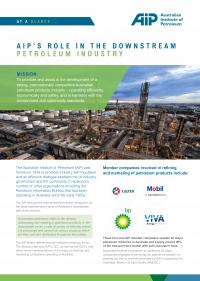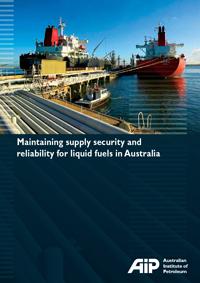Resources
Date
Description
Through submissions to review processes, AIP aims to inform the community about the downstream petroleum industry, and its significance to the national economy, by making available comprehensive factual information and data about the industry and its performance over time. AIP material also…Date
Description
Shifting consumer preferences, as well as economic and policy changes, have seen the demand for LPG powered vehicles and LPG fuel decline sharply in recent years.
Date
Description
The Australian Institute of Petroleum (AIP) was formed in 1976 to promote industry self-regulation and an effective dialogue between the oil industry, government and the community. It replaced a number of other organisations including the Petroleum Information Bureau that had been operating in…
Date
Description
AIP has produced a new publication – Maintaining Supply Security and Reliability for Liquid Fuels in Australia – which provides a factual overview of the liquid fuels market and supply chain in Australia. It also details the key factors influencing the secure and reliable supply of liquid fuels to…Date
Description
There is an extensive range of Federal, State/Territory and Local government regulations and legislation applying to refineries and businesses operating in the downstream petroleum industry. Some of the key regulations are outlined below. Formal Price Monitoring On 17 December 2007, under…Date
Description
The NOSEC is a committee of the Ministerial Council on Energy (MCE) and provides the main executive channel through which Commonwealth and State Governments formulate their overall management response to a national liquid fuel emergency. The task of the NOSEC is to ensure that the Federal…Date
Description
Transport fuel imports do not increase risk for supply reliability and security A diversity of global supply sources and local import facilities provide a range of options for Australia. Australia is already dependent on imports to meet the growth in demand for transport fuels (eg. demand…Date
Description
Self-sufficiency in transport fuels is not necessary for supply security Security of supply is the result of resilient and efficient supply chains and robust risk management – it is not about self-sufficiency or independence from markets. There are 3 critical elements of any strategy to…Date
Description
Through submissions to review processes, AIP aims to inform the community about the downstream petroleum industry, and its significance to the national economy, by making available comprehensive factual information and data about the industry and its performance over time. AIP material also…Date
Description
Liquid Fuel Supply Security and Reliability The Australian liquid fuel supply chain has considerable span and diversity. It includes crude and petroleum product shipments into and around Australia, refinery throughput, bulk fuel storage tanks, extensive terminal and distribution networks, over…